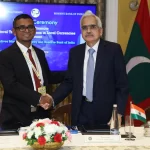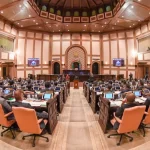In recent years, South Asia has witnessed a disturbing increase in religious intolerance, with harrowing incidents occurring in a region that is home to 24% of the world’s population. This troubling trend has profound implications for the socio-political landscape and affects not only the local populace but also international perceptions and relations for the region. Viewing these events from the perspective of the Maldives, a country with its unique religious and cultural dynamics, offers valuable insights into the broader issue of religious intolerance in the neighbourhood.
In a striking confluence of events, the incidents and reports cited in this article all occurred on June 20th, 2024, underscoring the immediacy and pervasiveness of religious intolerance across the region.
Pakistan was shaken by a brutal incident involving a tourist accused of blasphemy in Madyan, a famous tourist spot in the Swat Valley. The individual was burned alive, a tragic end fuelled by mob violence and religious fanaticism. A headline in Dawn on June 20th read: “Man killed by a mob over alleged desecration of the Holy Quran.”
Blasphemy laws in Pakistan are notoriously harsh and often lead to extreme acts of extrajudicial violence. These laws are frequently misused, leading to false accusations and personal vendettas under the guise of religious fervour. This incident underscores the perilous state of religious tolerance in Pakistan, where fear and extremism overshadow justice and humanity. Pakistani media has not shied away from these dastardly incidents. A Dawn editorial stated, “This sort of ghastly behaviour has become the norm in Pakistan, as such incidents are occurring with frightening frequency.”
Raza Rumi tweeted, “This is what Pakistan’s ruling classes have done to the country: nurtured extremism, legislated hate, exclusion and brainwashed generations that consider violence in the name of religion as righteous! Tourist Lynched In Swat After Being Accused of Blasphemy.”
In India, another disturbing episode unfolded in Madya Pradesh, where allegations of beef possession led to the demolition of Muslim houses and communal violence. The accusation was later revealed to be fabricated, yet it incited severe repercussions.
A headline from The Quint read, “‘Left Homeless in Heat Before Eid’: How The Demolition Took Place in MP’s Mandla.” The incident underscores the fragile nature of communal harmony in India, where religious and cultural identities can become flashpoints for violence. Such acts not only target individuals but also aim to instil fear within minority communities, perpetuating a cycle of distrust and animosity.
On June 20th, The Quint reported another incident in Aligarh: “Muslim Man Lynched Over Suspected Theft, BJP Leaders Defend Accused.” This highlights the ongoing tension and the delicate balance required to maintain communal peace.
The Maldives, although relatively peaceful compared to its neighbours, is not immune to the complexities of religious intolerance. With extreme religious interpretations on the rise, the politics of extremism is at play. The celebration of International Yoga Day yesterday brings this issue into sharp focus. Last year, a Yoga Day event in the Maldives turned violent when extremists attacked participants in a stadium. This incident marked a significant deviation from previous years, particularly during the tenure of President Abdulla Yameen, when Yoga Day was celebrated without incident.
A tweet by @Adamiington highlighted the politicization of Yoga Day: “The following photos are between 2014 to 2018 during the @ProgressPartyMV administration when Yoga was practiced nationwide with the full support of @prz_ymn. The anti-yoga uprising during President @ibusolih’s reign was a malicious political scam.”
The politicization of Yoga Day in the Maldives reflects a broader regional trend where religious practices and identities are manipulated for political gain. Under President Yameen’s administration, religious harmony appeared more stable, suggesting that political leadership plays a crucial role in either mitigating or exacerbating religious tensions.
Examining these incidents from a Maldivian perspective reveals several critical points. While speaking about extremism, it’s notable that many are quick to depict groups like the Taliban in poster-size caricatures, while other actors exhibiting similar extremist fervour are often relegated to stamp-size representations. This disproportionate portrayal can distort the understanding of religious intolerance in the region.
For the Maldives, recognizing this imbalance is crucial in shaping educational initiatives and raising awareness that promote a pluralistic worldview. By emphasizing its centuries-old tradition of tolerance, the Maldives can strive to outshine in religious harmony, positioning itself as a model of coexistence in an increasingly globalized world.
Firstly, the Maldives, while Muslim, has historically maintained a degree of religious tolerance and peaceful coexistence. However, the rise of extremist interpretations and the spread of half-baked ideologies threaten this harmony, as evidenced by the Yoga Day attack. This mirrors the broader regional pattern where religious intolerance is often fuelled by political agendas and extremist narratives.
Secondly, the incidents in Pakistan and India highlight the severe consequences of religious intolerance—violence, fear, and social fragmentation. The Maldives, by observing and learning from these examples, can strive to reinforce its policies and century-old societal norms to prevent similar occurrences.
Lastly, the role of the political leadership of Dr. Muizzu is paramount. Just as President Yameen’s era saw peaceful Yoga Day celebrations, current and future leaders in the Maldives must prioritize religious tolerance and counter-extremism to safeguard the nation’s social fabric and maintain its international image as a favoured tourist destination.
The rising tide of religious intolerance in South Asia, marked by brutal blasphemy laws in Pakistan and communal violence in India, serves as a stark warning to the Maldives. This warning carries particular weight given the Maldives’ own recent history, which saw it become the highest per capita supplier of foreign fighters to jihadist groups in Syria. By recognizing and addressing these issues, the Maldives can work towards maintaining its unique position as a relatively peaceful nation in a turbulent region. The key lies in vigilant political leadership, robust legal frameworks, and a commitment to fostering a culture of tolerance and understanding, avoiding the slide into mob rhetoric and not jeopardizing the centuries-old reputation for the sake of national politics. Only then can the Maldives navigate the complex waters of religious politics without succumbing to the waves of intolerance that are affecting others in the vicinity.












